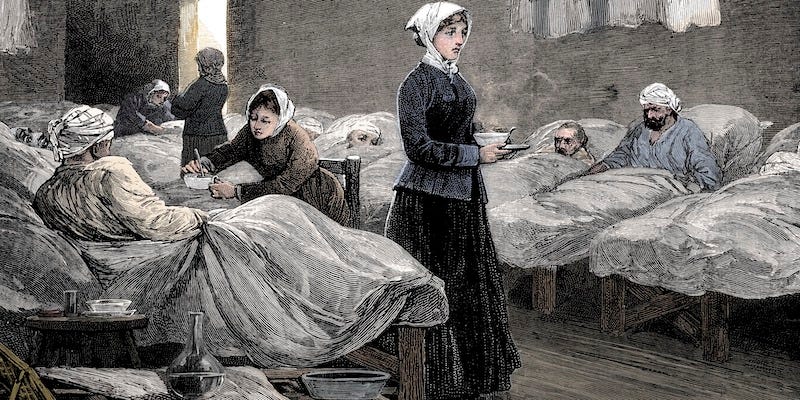Introduction:
In the tapestry of healthcare, the role of nursing stands as a pillar of compassion, expertise, and unwavering dedication. Behind this noble profession are individuals whose pioneering efforts laid the foundation for modern nursing as we know it today. This article delves into the stories of the trailblazers who, through courage, resilience, and innovation, became the pioneers of nursing, shaping the course of healthcare history.

1. Florence Nightingale: The Lady with the Lamp
No exploration of nursing pioneers is complete without mentioning Florence Nightingale, often hailed as the founder of modern nursing. During the Crimean War in the 1850s, Nightingale revolutionized healthcare by introducing sanitation practices, emphasizing hygiene, and establishing the Nightingale Training School for Nurses. Her tireless efforts earned her the moniker “The Lady with the Lamp” and set a standard for nursing excellence worldwide.
2. Mary Seacole: A Heroine in Times of War
While Nightingale’s contributions were pivotal, Mary Seacole, a Jamaican-Scottish nurse, made indelible marks during the Crimean War as well. Denied the opportunity to serve under Nightingale, Seacole funded her own journey to the warfront and established the “British Hotel” near the battlefields. There, she provided medical care, comfort, and a haven for soldiers. Mary Seacole’s legacy celebrates diversity in nursing and highlights the impact of perseverance in the face of adversity.
3. Clara Barton: The Angel of the Battlefield
Clara Barton, a remarkable figure during the American Civil War, earned the title “Angel of the Battlefield” for her selfless service. Barton tended to wounded soldiers on the front lines, earning her the distinction of founding the American Red Cross in 1881. Her commitment to humanitarian aid extended beyond borders, leaving an enduring mark on both nursing and disaster relief.
4. Dorothea Dix: Champion of Mental Health Advocacy
In the mid-19th century, Dorothea Dix emerged as a trailblazer in mental health nursing. Recognizing the deplorable conditions in mental asylums, Dix tirelessly advocated for reform. Her efforts led to the establishment of mental health institutions and laid the groundwork for compassionate care for individuals with mental illnesses. Dix’s legacy transcends her time, emphasizing the importance of mental health advocacy within the nursing profession.
5. Mary Eliza Mahoney: Breaking Barriers in Nursing Education
Mary Eliza Mahoney holds the distinction of being the first African American woman to work as a professionally trained nurse in the United States. Graduating from the New England Hospital for Women and Children Training School for Nurses in 1879, Mahoney became a trailblazer for diversity in nursing. Her commitment to breaking racial barriers paved the way for future generations of minority nurses.
6. Margaret Sanger: A Trailblazer in Reproductive Health Nursing
Margaret Sanger, a nurse and birth control activist, played a pivotal role in shaping the landscape of reproductive health nursing. In the early 20th century, she advocated for women’s access to contraception and family planning. Sanger’s relentless efforts led to the foundation of Planned Parenthood, making her a key figure in the intersection of nursing and reproductive health.
7. Virginia Avenel Henderson: Defining Nursing Theory
Virginia Henderson, a nurse theorist, made significant contributions to the field by developing the “Henderson Theory of Nursing.” Known as the “First Lady of Nursing,” Henderson’s theory emphasizes the nurse’s role in assisting individuals to gain independence in meeting their healthcare needs. Her work laid the groundwork for contemporary nursing theories and highlighted the holistic nature of patient care.
8. Lillian Wald: Founder of Public Health Nursing
Lillian Wald, a visionary nurse and social reformer, is credited with founding public health nursing in the United States. Wald established the Henry Street Settlement in New York City, where nurses provided healthcare, education, and social services to the impoverished. Her pioneering work in public health nursing contributed to the recognition of nursing as a crucial force in community health.
9. Sister Elizabeth Kenny: Revolutionizing Polio Treatment
Sister Elizabeth Kenny, an Australian nurse, revolutionized the treatment of polio in the early to mid-20th century. Her unconventional approach to polio management, which included early mobilization and physical therapy, challenged prevailing medical practices. Kenny’s dedication to patient care transformed the treatment of polio, showcasing the potential for nurses to reshape healthcare practices.
10. Faye Abdellah: Innovator in Nursing Research
Faye Abdellah, a nurse researcher, made significant strides in nursing science by developing the “21 Nursing Problems” theory. This framework aimed to guide nursing research and practice, emphasizing a patient-centered approach. Abdellah’s work laid the groundwork for evidence-based nursing practice and highlighted the importance of research in advancing the nursing profession.
Conclusion:
The history of nursing is a rich tapestry woven with the dedication, innovation, and resilience of remarkable individuals. From Florence Nightingale’s lamp-lit rounds to Faye Abdellah’s pioneering research, these trailblazers have shaped the profession into what it is today. As we celebrate the pioneers of nursing, let their stories serve as an enduring source of inspiration for current and future generations of nurses, reminding us of the transformative impact one person can have on the landscape of healthcare.